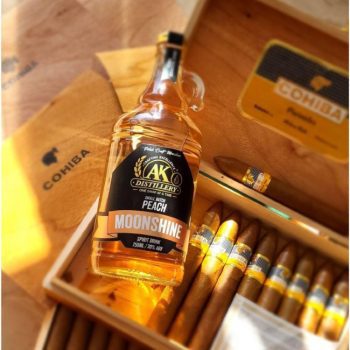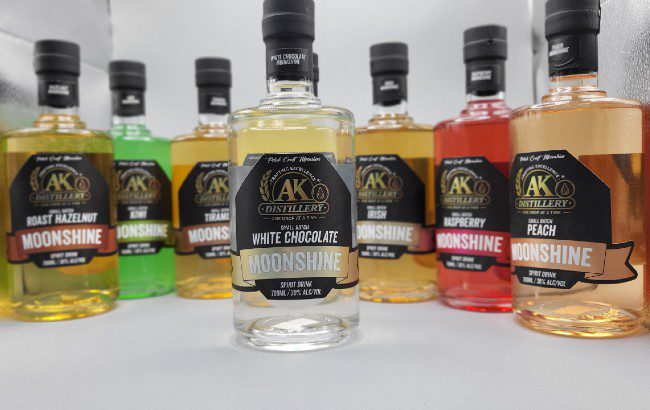Moonshine: how AK Distillery is spearheading a renaissance
By SB editorialFor centuries in Poland, bimber – the local word for moonshine – has been whispered about, shared at weddings and wakes, hidden in forests and farmhouses; dismissed by outsiders as little more than contraband. But things are starting to change.

Moonshine is no longer a ghost of the past – it is one of the fastest-rising heritage spirits across the globe, with younger drinkers driving a renewed interest in authenticity, craft, and cultural rediscovery.
In Poland, online searches for ‘bimber’ surged by more than 40% last year, with small distillers increasingly experimenting with flavour, process, and premiumisation.
In the UK, the first distillery dedicated to authentic Polish-style moonshine, AK Distillery, is starting to notice the renewed interest in this category. Founded by Agnieszka Gryszka and Krzysztof Nazarow, AK is reframing moonshine as a legitimate premium spirit: smooth, versatile, and award-winning. In fact, its range of small-batch flavoured expressions has already secured accolades on global stages – demonstrating the potential of this new brand.
To understand the significance of AK Distillery’s mission, you must understand the history of bimber. In Podlasie, a wild and heavily forested region of northeastern Poland, moonshine was as much part of rural life as hunting, fishing, and logging. As one chronicler described it: “Moonshine is the ghost of the wilderness – alchemy in glass bottles, born from potatoes, rye, or sugar, distilled in copper stills hidden deep in the woods.”
Bimber was not simply about intoxication. It was a stand of survival, one of solidarity and defiance: produced during wartime shortages, traded during Communist-era austerity, and poured under tables during weddings, funerals, and clandestine gatherings. The flavour varied wildly depending on who made it and what they had to hand (as well as how closely they watched the fire). Some batches were harsh and fiery; others were surprisingly smooth, infused with fruits, herbs, or nuts.
What is striking today is how these old traditions of adaptability, flavour experimentation, and community mirror the language of modern craft spirits. Just as gin makers infuse their distillates with foraged botanicals, and mezcaleros speak of terroir, bimber makers take pride in the uniquely personal twists of their liquid.
It is this energy and heritage that AK Distillery is channelling – but with one key difference: its moonshine is legal, regulated, and refined to a premium standard. A bottle that can sit confidently alongside vodka, gin, or even whisky.
A founder’s vision

At the heart of AK Distillery is founder Gryszka, a Polish-born entrepreneur whose mission is clear: to elevate moonshine from stereotypes into a respected craft spirit.
“The inspiration for AK and idea to produce moonshine comes from my Polish heritage and wanting to go a different route from the more classic spirits,” she explains. “It’s about celebrating authenticity, craftsmanship, and cultural heritage (with a sprinkling of rebellious spirit) while giving moonshine a fresh, premium identity. Bimber has always been part of who we are, but outside Poland it was either misunderstood or invisible. I wanted to change that.”
The result is the UK’s first distillery, based just outside of Manchester, dedicated exclusively to Polish-style moonshine. The site produces a spectrum of small batch expressions, distilled and infused by Nazarow that range from traditional clear spirits to flavoured infusions.
Flavour is where Nazarow leans most heavily into innovation. Current expressions include white chocolate, kiwi, peach, raspberry, tiramisu, pistachio, and roasted hazelnut.
“Our premium moonshine is distilled five times,” Gryszka adds proudly. “Customers often tell us it’s smoother than Belvedere – and that’s not our claim, that’s their opinion.”
AK Distillery may be small, but its ambition has already been validated on the global stage. In 2025, the brand walked away with an impressive tally at The Speciality Spirits Masters, part of The Global Spirits Masters Competitions blind-tasting series: seven Gold and three Silver medals across its range.
The wins also underscore the potential of moonshine as a category beyond Poland. Judges praised AK Distillery’s range for its balance of flavour, smoothness, and originality – qualities that challenge outdated assumptions of moonshine as a hard, crude or dangerous drink.
“We’ve worked very hard to show that moonshine doesn’t have to be raw or harsh,” Gryszka notes. “It can be elegant, it can be creative, and it can absolutely hold its own against premium spirits on the back bar.”
Moonshine meets modern drinking culture
Where AK Distillery truly shines is in demonstrating the versatility of moonshine. Unlike vodka, which has long struggled to shake off its reputation as neutral and characterless, Polish-style moonshine embraces bold flavour and functional mixability.
Among Gryszka’s recommended serves include Irish Moonshine (neat, or in iced coffee and oat-milk cocktails), a Polish Spritz (raspberry Moonshine with Prosecco or lemonade, garnished with mint) and White Lies (white chocolate Moonshine mixed with blackcurrant juice).
This positioning – somewhere between vodka, liqueur, and flavoured spirit – makes moonshine adaptable to both bars and at-home experimentation. It is strong enough to stand as a neat pour, yet playful enough to feature in creative cocktails.
Restaurants and bars in Greater Manchester are already taking note. According to Gryszka, several local venues have begun replacing vodka entirely with moonshine.
Looking ahead, AK Distillery has no intention of slowing down. Seasonal limited editions are already planned, with upcoming festive releases including Apple Pie and Gingerbread moonshine, followed by spring flavours such as Cucumber and Hibiscus. Each run will be capped at 150 bottles, creating a sense of rarity and collectability.

Establishing a Moonshine Council Standards CIC
Beyond the product, Gryszka is also championing the establishment of a Moonshine Council Standards CIC, a body intended to formalise quality and authenticity standards for moonshine producers across the world.
“Moonshine deserves to be taken seriously,” she insists. “That means creating a framework where quality is protected, innovation is encouraged, and consumers know they’re drinking something safe and premium. We want to make sure that those entering the category do it right.”
It’s an ambitious move, but one that mirrors what happened with mezcal, cachaça, or even gin: drinks that went on to achieve global recognition through standardisation and craft storytelling.
So, could moonshine be the next big craft spirits category in the UK? The parallels are compelling. Gin was once dismissed as “mother’s ruin” before reemerging as the darling of craft spirits (admittedly this took a century). Mezcal was once a curiosity; now it is a premium staple in cocktail bars. Even vodka, after years of neutrality, is experiencing a renaissance through authentic flavours and even terroir-driven expressions.
With AK Distillery at the helm, Polish-style moonshine has the potential to become more than a niche curiosity – it could be the start of a new category within the UK spirits market.
The combination of heritage, innovation, and quality has already been recognised through awards and trade platforms. Now the task is to continue educating trade and consumers alike, showing them that moonshine is not just a relic of the past, but a vibrant, versatile spirit of the present and future.
As Gryszka puts it: “Each batch of moonshine we make is about pride – pride in our heritage, pride in our craft, and pride in surprising people with something they didn’t expect. To me, moonshine is not a ghost of the past. It’s a spirit reborn.”
Related news
Sugarlands named official moonshine of Ryder Cup
